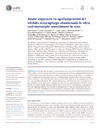Identificador persistente para citar o vincular este elemento:
https://accedacris.ulpgc.es/jspui/handle/10553/75277
| Título: | Acute exposure to apolipoprotein A1 inhibits macrophage chemotaxis in vitro and monocyte recruitment in vivo | Autores/as: | Iqbal, Asif J Barrett, Tessa J Taylor, Lewis McNeill, Eileen Manmadhan, Arun Recio Cruz, Carlota Pilar Carmineri, Alfredo Brodermann, Maximillian H White, Gemma E Cooper, Dianne DiDonato, Joseph A Zamanian-Daryoush, Maryam Hazen, Stanley L Channon, Keith M Greaves, David R Fisher, Edward A |
Clasificación UNESCO: | 3207 Patología | Fecha de publicación: | 2016 | Publicación seriada: | eLife | Resumen: | Apolipoprotein A1 (apoA1) is the major protein component of high-density lipoprotein (HDL) and has well documented anti-inflammatory properties. To better understand the cellular and molecular basis of the anti-inflammatory actions of apoA1, we explored the effect of acute human apoA1 exposure on the migratory capacity of monocyte-derived cells in vitro and in vivo. Acute (20–60 min) apoA1 treatment induced a substantial (50–90%) reduction in macrophage chemotaxis to a range of chemoattractants. This acute treatment was anti-inflammatory in vivo as shown by pre-treatment of monocytes prior to adoptive transfer into an on-going murine peritonitis model.We find that apoA1 rapidly disrupts membrane lipid rafts, and as a consequence, dampens the PI3K/Akt signalling pathway that coordinates reorganization of the actin cytoskeleton and cell migration. Our data strengthen the evidence base for therapeutic apoA1 infusions in situations where reduced monocyte recruitment to sites of inflammation could have beneficial outcomes. | URI: | https://accedacris.ulpgc.es/handle/10553/75277 | ISSN: | 2050-084X | DOI: | 10.7554/eLife.15190 | Fuente: | eLife [ISSN 2050-084X], n. 5, e15190 |
| Colección: | Artículos |
Citas de WEB OF SCIENCETM
Citations
57
actualizado el 22-feb-2026
Visitas
52
actualizado el 10-ene-2026
Descargas
59
actualizado el 10-ene-2026
Google ScholarTM
Verifica
Altmetric
Comparte
Exporta metadatos
Los elementos en ULPGC accedaCRIS están protegidos por derechos de autor con todos los derechos reservados, a menos que se indique lo contrario.
